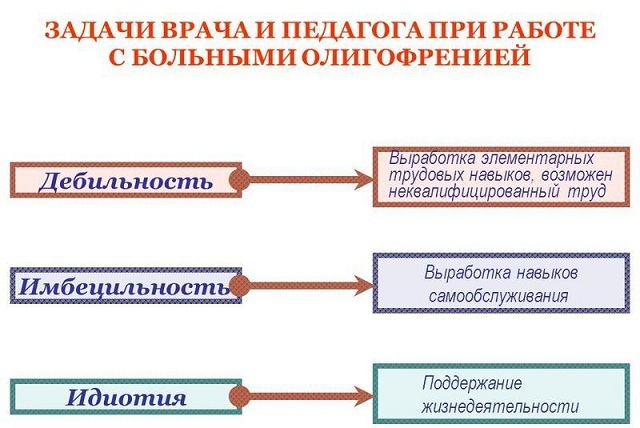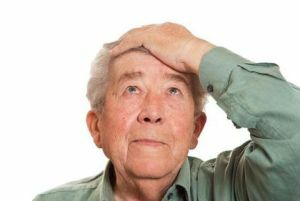 Psycho-organic syndrome( minimal brain dysfunction, organic defect) is an organic nature of the defect, under which physicians imply a general mental helplessness and a sharp decline in thought processes, a decline in memory and intelligence, a weakening of strong-willed features, emotional instability, a decline in the ability to work.
Psycho-organic syndrome( minimal brain dysfunction, organic defect) is an organic nature of the defect, under which physicians imply a general mental helplessness and a sharp decline in thought processes, a decline in memory and intelligence, a weakening of strong-willed features, emotional instability, a decline in the ability to work.
The syndrome itself can be diagnosed in patients of all age groups, but most often occurs in older people, less able to adapt to environmental conditions.
The root of the problem
Many factors can cause the development of this pathology, differing in their etiology and development mechanism. Among the most common underlying causes that can lead to the development of this syndrome, physicians refer to the following:
- atrophic form of the disease affecting the brain - this includes Alzheimer's, Parkinson's, Pick's and so on;
- pathology affecting vessels and veins - atherosclerosis, hypertension and other diseases;
- cerebral, as well as the general nature of the infectious processes of , which lead to irreversible changes in brain structure - neurosyphilis or encephalitis, damage to the vasculature due to influenza, varicella or scarlet fever, malaria;
- neoplasms developing in the brain of ;
- head injury , as well as epileptic seizures, diseases accompanied by recurrent seizures and seizures;
- intoxication of the body due to poisoning by psychological stimulants or drugs, organic compounds;
- development of somatic pathologies , most often endocrine nature of origin.
An organic psychosyndrome can be both a residual phenomenon and a consequence of a transferred progressive CNS pathology.
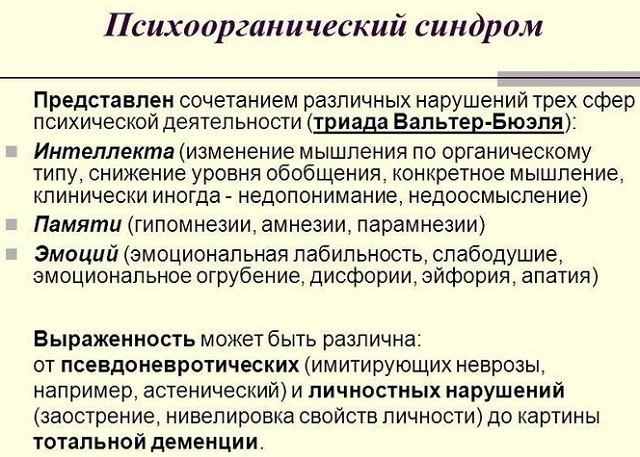
Symptoms and clinic
The psycho-organic syndrome always has negative clinical manifestations and is most often diagnosed by doctors in elderly people and depending on the stage of the disease, it can manifest itself with quite specific symptoms.
So in the early stages, the pathology can manifest itself as the symptoms that are characteristic of other diseases - which can complicate the diagnosis at times. Nevertheless, according to the medical classification set forth in ICD-10, the symptoms of the psychoorganic syndrome at the initial stage of development are:
- a constant thirst and attacks of headache;
- appetite breakdown and increased sensitivity to any changes in weather - meteorological dependence;
- patient is concerned about frequent attacks of dizziness and disturbance in sleep, as well as all signs of autonomic instability;
Along with this characteristic for pathology signs are violations of memory and intelligence, emotional and volitional spheres( the so-called Walter Buel triad).If there is a memory fault - this will be displayed at all stages of this process, at the 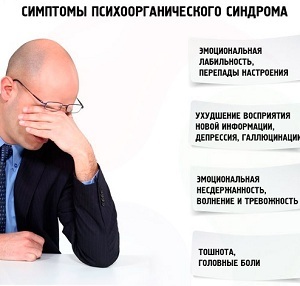 stage of memorization and retention, reproduction.
stage of memorization and retention, reproduction.
In addition, there are also violations in the process of orientation in space and time, location, and ultimately in relation to one's own personality.
This disease manifests itself in the violation of the intellectual sphere - in this case, the symptomatology of the disease will manifest itself in the following:
- the patient's inability to learn even the most basic things of , but most of this refers to a new person for the recently received information, at that timeas earlier knowledge is retained for a certain period of time.
- failure in the speech - in this respect the vocabulary in the patient gradually decreases, it becomes monosyllabic, the patient responds in a pattern.
If we talk about violations in the emotional sphere - here the pathology will manifest itself with the following symptoms:
- rapid emotional, mental exhaustion;
- loss of will and its weakening;
- inability to restrain their impulses, whether it is joy or anger.
Due to the individual characteristics of the personality, the patient may have a depressive state, hallucinations and delirium, seizures of epilepsy and twilight disorder, especially at night.
Options for the development of
syndrome Following medical practice, encephaloasthenic syndrome, can have 4 variants of the course:
- Asthenic version of disease course. At this stage, there is an increase in mental and physical exhaustion, as well as excessive irritability and instability in the manifestations of emotions. In this version of the course of pathology, the patient reacts very sharply to any, even the most insignificant stimulus - smell, sound or light. The defeat of the intellectual sphere is insignificant, there is a small decrease in memory. The patient's condition can be assessed using the Pirogov's symptom scale.
- The explosive version of is already the next stage in the course of the psychoorganic syndrome. This variant is manifested by a combination of emotional excitability and irritability, manifestations of aggressive attacks, there are also moderate memory impairments, there is no ability to adapt, adapt. Along with these symptoms, loss of self-control, as well as willpower and excessive impressionability are possible. At this stage, patients often abuse alcohol, the general condition worsens, and the emergence of such particularly valuable superiors, so that the patient develops hysterics and signs of an organic disorder, loss of self-control.
- The euphoric version of - at this stage, the patient shows an increase and improvement in mood, he shows complacency, criticism decreases to himself. Also noted are memory disorders, there is no ability to remember even simple, new information, there is an increased attraction, with periodic flashes of attacks of anger and aggressiveness. In especially severe cases, the patient experiences a violent nature of bouts of laughter or crying, the cause of which the patient is unable to explain, which are replaced by tearfulness.
- Apathetic version of - at this stage of the pathology of the patient, the range of interests is narrowing, significant memory disorders, indifference to any situations, irritants manifest themselves. Distant behavior of the patient resembles schizophrenia, but distinguish them allow symptoms such as memory and asthenia, there are bouts of unnatural nature and the root causes of laughter or crying, which is absolutely not typical for schizophrenics.
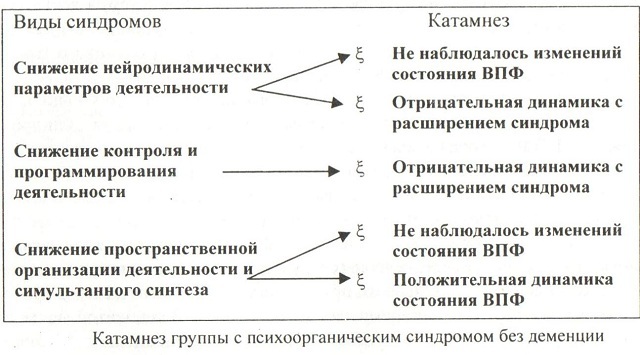
Pathology can manifest itself in different ways and by virtue of the stage of the disease in which it is located. Physicians distinguish the acute and chronic form of the flow of an organic psychosyndrome.
 The acute form of the pathology can manifest itself in such problems as head trauma or intoxication, poisoning of the organism, pathology of infectious theology. With properly selected and timely treatment, timely diagnosis and identification of the root cause of the syndrome - the patient can return to normal life.
The acute form of the pathology can manifest itself in such problems as head trauma or intoxication, poisoning of the organism, pathology of infectious theology. With properly selected and timely treatment, timely diagnosis and identification of the root cause of the syndrome - the patient can return to normal life.
If treatment is untimely and ineffective, pathology will develop into a chronic stage of its own. The causes may be Alzheimer's disease and Huntington's chorea, head trauma, benign neoplasm. Treatment at this stage is reduced to reducing the manifestation of negative symptoms, although in some cases, if the underlying disease can be cured, then the symptoms of the pathology will be completely eliminated.
Diagnosis and treatment of
Before making a diagnosis - the doctor conducts a complete examination and diagnosis of the patient. Such measures are carried out in a complex and consist of the use of such techniques:
- examination of the patient and his survey of , his surroundings, the collection of an anamnesis, his analysis;
- the direction for the delivery of biomaterial for laboratory testing of - in this case the patient hands over his own blood and urine for analysis, the doctors determine the level of his bilirubin in the blood, as well as ALT and AST;
- examination of the patient with the help of hardware methods - using a computer tomograph and X-ray study of the cranium, EEG.
In addition, the patient may need to consult a neurologist, as well as a therapist.
Treatment of psycho-organic syndrome is always complex with the appointment of medications, as well as the passage of a course of physiotherapy and the reception of homeopathic remedies.
The drug course provides for the appointment of the following drugs in the therapy regimen: 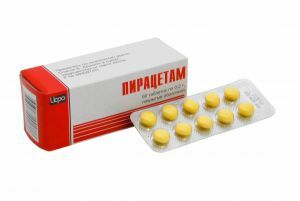
- nootropic medicines - it can be Piracetam, Fenotropil, Semax, Cerebrolysin;
- neurotrophic can restore normal blood flow to the brain;
- cerebros and neuroprotectors , as well as vitamins, which contain vitamins B, C, E, nicotinic acid in a higher dosage.
The course of physiotherapeutic procedures allows improving the functions of the central nervous system, strengthening immunity and activating all the defenses of the body, increasing the ability to adapt in new conditions.
If the patient does not have indications for physiotherapy, such as cancer and tuberculosis, heart failure, fever, or acute infectious disease, coniferous baths or those with the addition of sea salt, electrophoresis and magnetotherapy can be prescribed.
If it is put for the purpose of lowering the muscle tone, paraffin baths and reflexotherapy, massage and manual therapy are prescribed.
The use of ultrasound and thermal stimulation of the patient, physiotherapy with the use of current pulses, also have a positive effect.
If the patient has experienced a stroke and the psycho-organic syndrome has developed - the physician appoints all the physiotherapeutic procedures only after 1-1.5 months after the acute stage of the disease.
Complications and consequences
Prognosis directly from the underlying causes that lead to the development of this syndrome. In most cases, the patient simply loses contact with the society, loses the skills to self-service, becoming completely dependent on one's surroundings, relatives and friends.
Physicians in 8 out of 10 cases diagnose total disability in its persistent manifestation, inability to engage in both physical and intellectual labor.
According to the statistics - data on the complete cure of a patient with a diagnosed psycho-organic syndrome does not exist.
Normal adaptation in the patient is reduced to the minimum values, because according to statistical data the society does not accept such patients as close relatives. In addition, the constantly increasing dementia in its manifestation leads to the fact that the patient loses the ability to serve himself independently.
To all other things throughout the period of the course of the disease, there are also disorders in the neurological sphere and as a consequence - the possible development of coma.



